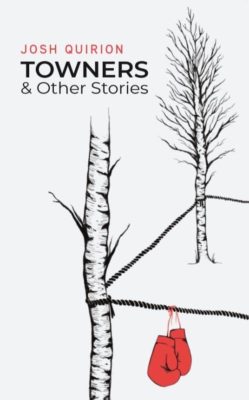The Eastern Townships is a picturesque geographical expanse that once constituted the seigneuries south of the Saint Lawrence River and east of Montreal. It boasts not only an attractive rural landscape, but also a proud lineage of writers who have either lived (or still live) there, or extol its manifold virtues, including the likes of Mordecai Richler, D.G. Jones, F.R. Scott, Anne Fortier, Susan Briscoe, Ann Scowcroft, Ralph Gustafson, and, of course, Louise Penny. To this range of authors, we may admit Josh Quirion, whose book, Towners & Other Stories, was published by Shoreline Press this summer.
Shoreline Press has traditionally focused on publishing first-time authors, as is the case here – a laudable enterprise, if skilled editors are engaged in the process. Towners & Other Stories, Quirion’s debut collection, features a novella and eight short stories, all of which largely concentrate on masculinist aspects of Eastern Townships culture. At a time when there is a demand for narratives that address cultures, identities, or persons that have been marginalized, one could argue that the collection’s emphasis on a community outside of a cosmopolitan centre provides an alternative view; but although it does focus on a small, rural community, it is nonetheless framed by a white, middle-class perspective.

Towners & Other Stories
Josh Quirion
Shoreline Press
$19.95
paper
240pp
9781926953885
“Towners” draws on literary motifs and themes that have become to some degree cliché, including that of the poor-boy-meets-rich-girl variety. While the context in the Eastern Townships may be relatively fresh, the narrative intrigue is less so. Indeed, much of the story – both its narrative line and expression – needed to be subjected to greater editorial rigour: it is strewn with mannered dialogue, odd idiomatic expressions, and the overuse of adverbs and adjectives (for instance, “parasitical pariah”). The tendency to overwrite impedes narrative flow. Here is one of several examples: “He meditated, accustoming himself to his respiration in the immeasurable crepuscular hayfields of White Pine.”
By contrast, the short stories are crisper, more sharply delineated, and display Quirion’s potential. Each story is relatively spare, many of them offering an unexpected, swift resolution that is precise in its delivery. “The Beast in the Basement,” for example, is a lean, unflinching, and harrowing account delineated in fewer than three pages. “Night Flowers” is also a streamlined narrative, which characterizes a young man’s proclivities that threaten to undermine his relationship with his partner, Stella. Even here, however, there are moments when Quirion does far too much “telling,” and does not allow the stories to unfold on their own. The collection as a whole thus confirms that, while he has not fully matured as a writer, Quirion can eventually achieve his artistic potential. mRb






0 Comments